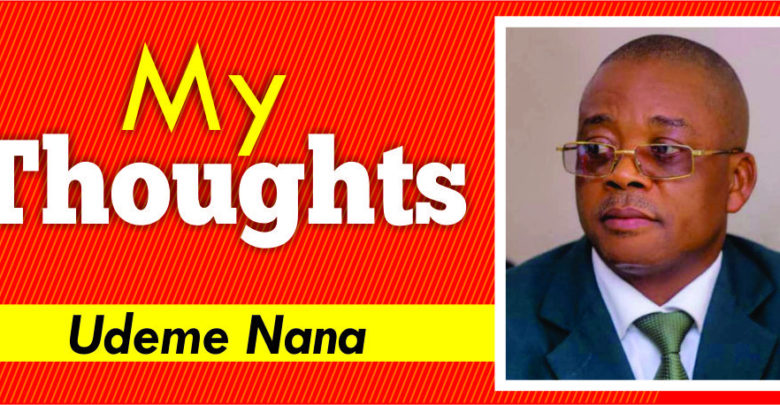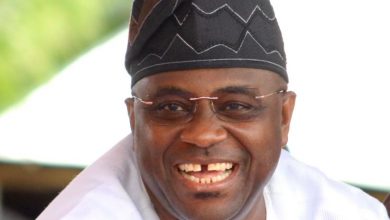Present- Day Chiefs And Titles

Aaron Fenson Aduwem is about 83 years old. As a young boy, he admired the uniform of the soldiers who were quartered in the village primary school where he attended during the second world war. He imagined that someday, he would join the Army and turn out in the well starched green uniform and shiny boots of the soldiers. However, in a twist of fate, his parents who dotted on him truncated that aspiration. They wanted their son to become a more “respectable” public servant in the country.
The young man, who had a flair for writing drifted into the media industry. He rose through the ranks as a Proof- reader, became a News Reporter and ultimately an Editor of a popular regional news organisation. His diligence exposed him to important contacts which opened up an avenue for him to be enlisted into the Diplomatic Service where he also excelled in his line of duty. He returned to the country with his integrity intact. Back in his home state, he was saddled with a high office which tasked his professional expertise and experience. He excelled in setting up media organisations and became a top flight Administrator .The Federal government tapped him again for service and in his new office which he became the Chief Executive, Mr Aduwem traversed the world attending conferences, representing his Council and country .He was a gold standard in hardwork, honesty and transparency .He rose creditably to his responsibilities and did not disappoint at the home front. Although Mr Aduwem was seen as a model public servant, respected by most people in his village, clan , Local government Area and state at large, nobody remembered him for the honour of any Chieftaincy award. And so, even at the ripe age of 83, he was addressed simply as Mister Aduwem. Nobody even took notice that he was honoured by his country with a national medal for his outstanding services to the nation at various positions. Nobody took notice of his support for the education of distressed students in his community nor his facilitation of the employment of several of his kinsmen into pensionable office. To his people, he was “that distant big man”.
The second example is that of a younger man in his early thirties, a secondary school drop – out, he left the village and nobody knew his whereabouts until he visits every year end. He is reputed to have shown his monied muscle when , within six months,he completely built a sprawling estate with several mansions all fenced around.The property was enriched by the sight of several gleaming state – of- the – art cars and SUVs .In his service are policemen as guards and he has a special seat in the local church.Nobody knows the source of his wealth and nobody bothers to ask.He would travel out for months, show up ocassionally in the village and disappears again to re- appear during festive seasons with signs of good money, in hard currency written all over him.He is like a god to the youths in his community and he does nothing other than hang out to buy them drinks whenever he shows up in the village.
Unlike the toiling old civil servant, the young man , Aniekan Udo-Udo has six different chieftaincy awards from his village, his clan, his paramount ruler and several neighbouring communities who have heard and seen how he lives large .The citations of the various titles give the impression of the greatest man around.Chiefs swear by him and would stand to greet him whenever he attends a public event .His personage looms large and nobody forgets to introduce him elaborately in glowing terms with exotic appellations which resonates with the audience. Some titles like “The Pillar”, ” Warrior”, “Thunder” ” Lightening”, ” The Sun”, ” Iroko” are examples of citations which young Udo Udo has under his belt.
In the mind of the traditional chiefs who cap others with these awards, the mightier and scarier the citation of the title, the more fitting the honour.
In the society today, Udo Udo has become the role model to most youths and he draws a larger crowd which drift towards him like butterflies are drawn to nectar. You wonder what sustainable contributions Udo Udo has made towards the progress of his community in real terms and you cannot place a finger on any. In several instances, these new generation title holders are not conversant with the culture of their people. They do not have a grasp of their local dialect or language which symbolise the values and essential characteristics of the people. If they have sired children, their kids bear foreign names which have no relationship with their ancestral and kinship ties.
It seems to this writer that present- day traditional rulers do not really bother about the promotion of indigenous culture including the language of communication especially in the public sphere. The last time a statewide conference to promote an indigenous language was held in Akwa Ibom State, not one traditional ruler attended to lend royal support.
It is pertinent to think aloud about whether local, clan and paramount rulers really know the people in their villages, clans and local government areas. Do they profile their citizens to know where they live and work? It would be interesting to know how contemporary chieftains have mediated on the dress sense of their people in addition to working to recreate a community where somebody was somebody’s somebody. This would safeguard our communities and ensure better security of people in their communities.
One must observe that the traditional institution has lost so much respect arising from the way modern – day ” rulers” give out titles. Prospective recipients more often determine the citation of their titles. Before this era of “anything is possible” chieftaincy titles were honours to persons who deserved and were seen by all to fully deserve them. Titles were not merely given to money bags whose source of wealth and means of livelihood was not known. How else would a younger Udo- Udo whose source of money is unclear receive so many titles and Mr Aduwem non despite his self discipline and work.
How did the society arrive at a station where the deserving are ignored while people with a cloud over them are esteemed?
Take Great Britain as an example, people are knighted by the Queen of England only on the basis of verifiable pedigree, good reputation and outstanding accomplishments in various fields of known endeavour. Not unknown advantures. Chieftaincy awards are not and should not be reduced to a joke, a source of amusement or a revenue generation activity for the palace.
Contemporary chiefs must focus on peace- building in their jurisdictions and not carry on as if they existed to legitimize temporary political office holders and other ” important” politically exposed persons in the society.
The traditional stool earned much respect when chietaincy titles were not hawked and auctioned to bidders .The occupants of the stools were respected when the amount of money given to them by overnight millionaires or billionaires were not a measure for title awards.
And for those who crave for chietaincy awards from other localities outside their ethnic group – here is a tip- many Governors, Senators, Ministers, Reprentatives, State Assemblymen , Council Chairmen and other political office holders have paid heavily for awards which are big in the headgear they wear but unwittingly hollow in real terms. Some have even paid money only to be celebrated as ” sentries” , “The Cleaner of the Palace Toilet,” ” Friend of the Palace Guards, ” The King’s Chief Praise singer , The mortar, The Pestle and several other outlandish and meaning less citations. They smile home with their supporters without reckoning with the full import of the titles.
Whenever our contemporary chiefs meet, they should do well to focus on how to reclaim their dignity, respect for their stools, their credibilty and integrity. They may not accept it but a lot of thrones have lost their lustre.
A re- invention would demand a de-coupling from their long intercourse with politicians at all levels seeing that politicians are seasonal leaders while they sit much longer on their stools.
In one word, present- day traditional rulers must rediscover how to thump their chests in defence of all that is good in their communities. Always.




